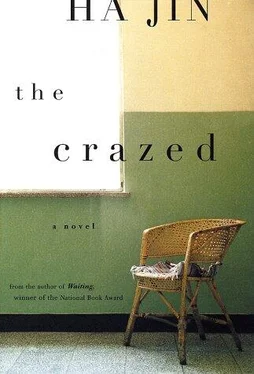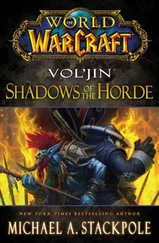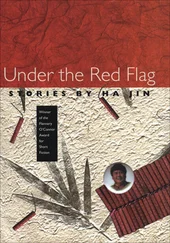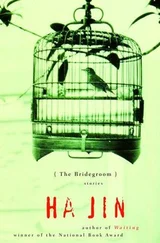Bewildered, fatigued, and frightened, the undergraduates gathered around Mantao and me, expecting us to come up with a solution. Neither he nor I had ever been to Beijing before, so we were at a loss too. We didn’t even know whether we should still head for Tiananmen Square as we had planned. Mantao kept grinning and assured the others that we’d find a way, but I could tell he was also nervous. He went away to make some phone calls, but fifteen minutes later he returned, rather downcast, saying he couldn’t get hold of anyone at the headquarters of the Beijing Autonomous Student Union. His cheeks puffed up and the corners of his mouth fell.
A dignified-looking old man told us that in some areas the army had begun fighting its way into the city. “Students,” he said, shaking his pockmarked face, “there’s no hope for this country anymore. You’d better go home now. Don’t waste your lives here. Those old bastards at the top won’t bat an eye to have you erased. Go back, please!” He couldn’t help his tears while speaking. Indeed, we heard quite a few gunshots coming from the west, where patches of pinkish light shimmered in the sky. After the man left, the woman who distributed the handbills told us that his son had been bludgeoned half dead by some policemen the night before.
What should we do? Sitting in a ring on the ground before the train station, we discussed our situation briefly and decided to set out on foot for Tiananmen Square. We would go in two groups, because we were not sure if all of us could get there and afraid that the police might stop us. Although we were unfamiliar with the city, it wouldn’t be difficult to find our way to the square. We could ask for directions, and a lot of other people seemed to be going there too.
But before setting off, we noticed a white minivan parked at a bus stop. On its roof was a taxi sign, so we talked to the driver, a man in his early thirties who had a bell-cheeked face and a large wart between his left brow and eye. He would charge twenty yuan for a trip downtown, but hearing we wanted to go to Tiananmen Square, he smiled and said, “I can give you a ride free, but I’m not sure if I can get you there. Most streets are blocked.”
“Please take us as far as you can,” I begged. “None of us has ever been here before.”
“All right, get in my car.”
We thanked him profusely; several girls even called him Uncle. My group, composed of sixteen people, began climbing into the van, which couldn’t hold more than fourteen passengers.
“All right, no more,” cried the man. “This is an old car. I’ll have a flat tire if it’s overloaded.”
So we left two boys with Mantao’s group and headed townward. The streets were messy, here and there crowded with pedestrians and bicyclers. Some areas, apparently occupied by people during the day, were strewn with fruit cores, cigarette cases, leaflets, crates, glass bottles. Across a broad street four double-length buses stood parallel to one another, forming a barricade, and their tires were all deflated. We had to turn left into a small back street. The citizens here looked quite resolved to deter the army. The driver told me that he was a veteran and had quit his regular job at a steel mill a year ago, and that if he hadn’t owned this minivan, he’d have joined the team of workers called Flying Tigers, which was most active in supporting the student movement. “It’s funny, I feel the car owns me now,” he said. “I can’t afford to be as reckless as I used to be.”
We had to stop and detour at many places. About half an hour later the driver gave up, saying to us, “You better get off here. There’s no way I can take you to Tiananmen Square. I’ve tried three different routes, all blocked up. Actually the square isn’t far from here, ten minutes’ walk at the most, but I can’t help you anymore.”
We all alighted and thanked him again for the lift. Following his directions, we headed for Tiananmen. But about a hundred yards later, at a street corner, we ran into a huge crowd of people, at least two thousand strong, who were assembled around a column of army trucks, all the backs of which were under canvas. At the head of the contingent were six armored personnel carriers with heavy machine guns atop them. The civilians begged the soldiers not to go farther downtown to harm the students. Some of them shouted slogans, such as “The People’s Army serves the people!” “We love our soldiers!” “Don’t butcher the young!” By now the sky was umber beyond the high buildings, as if a fire was burning in the distance. Though I had told my group to stick together, we soon began to have stragglers. Two girls disappeared in the crowd, and try as I might, I couldn’t find any trace of them. As I was thinking what to do, the crowd suddenly surged and pushed us in different directions. I looked around in panic — my group was scattered, most of them having vanished from sight, and none was with me.
No longer able to hold my team together, I elbowed my way forward through the people to see what the soldiers were like. I couldn’t reach the front and stopped halfway. From there I saw a young man, flat-faced and with long hair covering his ears, standing at the rear door of the first personnel carrier. He looked like a college student. He was lecturing the dusty-faced troops inside the vehicle and telling them that they had been deceived by the government, and that the city was in good order and didn’t need them here.
“They’ll turn back like the group in the morning,” a man in coveralls said to others about the soldiers.
“This must be a different unit, though.”
“Do they belong to the Thirty-eighth Army too?”
“No way to tell.”
“Yesterday an officer said they would never hurt civilians. He was a pretty good fellow.”
“Yeah, he said that after we gave his men a hamper of cucumbers.”
“But these men here look different.”
“Yes, like a bunch of hoodlums.”
A voice boomed at the people in the front, “Hey, ask them which army they’re from.”
“Yeah, ask them.”
A moment later the student cried back, “They’re from the Twenty-seventh Army. They said they didn’t like going downtown either, but they were ordered to get to Tiananmen Square by any means.”
“Tell them they’ll have to kill us civilians before they can pass.”
“Yes, we won’t let them go there.”
As people were talking, a jeep came up tooting its horn; inside sat a square-faced colonel and two bodyguards, all in steel helmets. The civilians parted to make way for the car to reach the front, assuming that the officer would order his troops to retreat. Seizing this opportunity, I squeezed forward through the crowd and got closer to the first personnel carrier. The tall colonel jumped off the jeep and went up to the student who was still talking to the soldiers. I was impressed by the officer’s handsome looks: broad eyes, thick brows, a straight nose, white, strong teeth, and a full chin. He looked like material for a general, at least in appearance. Different from his men, he wore a black necktie beneath his jacket, which had four pockets. His shoulder straps showed two stripes and one star. A purple belt tightened his waist, and a pair of binoculars hung on his left hip. Without a word he pulled out his pistol and shot the student in the head, who dropped to the ground kicking his legs, then stopped moving and breathing. Bits of his brain were splattered like crushed tofu on the asphalt. Steam was rising from his smashed skull.
Stunned, for two or three seconds we didn’t react. Then people staggered back and the crowd began churning. Turning to his men, the colonel ordered in a shout, “Move ahead! Shoot anyone standing in your way. Teach this rabble a bloody lesson!” He raised his pistol and fired into the air.
Читать дальше

![Lao Zi - Dao De Jing [Tao Te Ching] (english)](/books/3890/lao-zi-dao-de-jing-tao-te-ching-english-thumb.webp)
![Lao Zi - Dao De Jing [Tao Te Ching] (chinese)](/books/3891/lao-zi-dao-de-jing-tao-te-ching-chinese-thumb.webp)
![Lao Zi - Dao De Jing [Tao Te Ching] (espanol)](/books/3892/lao-zi-dao-de-jing-tao-te-ching-espanol-thumb.webp)







